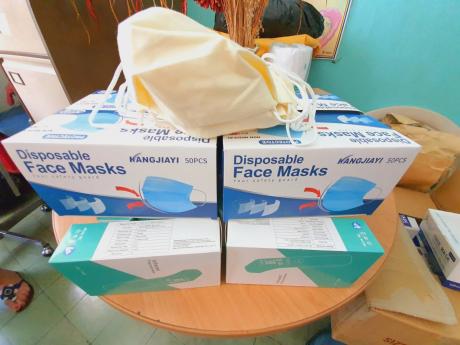Stand Up For Jamaica donates 17,000 masks, 9 thermal scanners to DCS
Stand Up For Jamaica (SUFJ) has donated 17,000 surgical and fabric masks and nine thermal scanners to the Department of Correctional Services (DCS) to aid in its fight against the spread of the coronavirus.
The masks are to be distributed to inmates and wards in correctional centres across the island.
The recent effort by the human-rights non-profit follows the donation of 4,000 care packages including rags, soap, disinfectant, and other items and 300 bottles of bulk hand sanitiser.
Carla Gullotta, executive director of SUFJ, promises that there are more items on the way as they aim to increase the capacity of the DCS.
“We plan to continue to do fundraising because we know how difficult the actual situation [is],” said Gullotta.
The Ministry of National Security on Thursday reported that 37 members of the correctional services and 24 inmates had tested positive for COVID-19.
Minister without Portfolio in the Ministry of National Security Matthew Samuda made the disclosure during a digital press conference.
Samuda said some 128 employees were tested for the virus, with the results of seven pending.
A total of 271 inmates were tested, and 11 of the positive prisoners have recovered.
For Gullotta, the numbers are “getting scary” and following the expected trend. She thinks, however, that the efforts of the DCS and the Ministry of Health have been effective thus far in curtailing further spread.
“I think that the trend is still small due to the efforts from DCS and the Ministry of Health to control the situation, but in a place of confinement, where everybody is always close, it is impossible, and I see the numbers of the officers, too,” said Gullotta.
Leslie-Ann Brown, director of corporate communications and public relations at DCS says masks are a very integral part of their daily infection prevention and control protocols. As a result, the donation is “really significant”.
Each facility needs approximately 45,000 masks per month notes Brown. Masks are also changed every four hours or earlier if they are compromised or saturated. The donation of disposable and fabric masks will thus help to minimise cost.
“We are truly grateful,” said Brown. “With 17,000 [masks] being donated, it would mean that the expense to replace disposable masks has been offset by the gift from Stand up for Jamaica, so it is a significant contribution to the control of the virus spread.”
SUFJ continues to agitate for the reduction of the population in police lock-ups, remand centres, and correctional centres.
The group is calling for the release of low-risk prisoners who fit the Ministry of Health and Wellness’ high-risk criteria, namely older adults and inmates and wards with chronic illnesses, co-morbidities, and weakened immune systems.
Inmates on remand for inability to pay cash bail; those incarcerated with a release date in the next six months; and those incarcerated for failure to pay fines or awaiting trial for multiple years, including mentally ill inmates detained at the court’s pleasure, some without facing trial, have been included in the list of those recommended for release.
The organisation’s legal representation fund to cover the legal costs of mentally ill prisoners incarcerated without trial is still active and, to date, has raised US$8,010 of its US$12,000 goal.
There is also a call for urgent action for children detained in lock-ups, remand centres, and correctional institutions, particularly those deemed uncontrollable.
Gullotta says the organisation is worried about the potential spread of COVID-19 in penal institutions in Jamaica.
“We are extremely concerned, and even if DCS has done impressive work, we look at the risk of being confined in places where social distancing is not possible, and we worry that if one inmate becomes positive, the virus can spread to others,” she said.
To donate to the Stand Up For Jamaica legal representation fund, visit gofundme.com/f/legal-representation-fund-for-jamaican-prisoners. To learn more or contact Stand Up For Jamaica, visit standupforjamaica.org or call (876) 948-8973. Have a good story you’d like to share? Email us at goodheart@gleanerjm.com.



